Just before the onset of the COVID-19 pandemic in March 2020, Sonal Shukla, Vaibhav Verma and their batchmates from the National Institute of Technology (NIT), Kurukshetra, went on a winter trek to Parashar Lake in Mandi, Himachal Pradesh, as their two-year MTech course was winding down.
“The mountains were stunningly beautiful, and we were in awe of the scenery. But then, we noticed that there were heaps of plastic waste scattered all over the place, spoiling the natural beauty. Seeing such a lovely place ruined by plastic waste left a very strong impression on both of us and made us realise the urgent need to address this growing problem,” Sonal recalls in a conversation with The Better India.
Prior to this trek, the Kanpur native (a student of electronics and communication) and Vaibhav (a student of environmental engineering) had already discussed their shared interest in preserving the environment. But this trek in the high climes of Himachal Pradesh ramped up their decision to pursue a career in waste management with a focus on plastic waste.
For Vaibhav, these events only reinforced a choice he made a few years ago. Growing up in Delhi, Vaibhav lived in a locality close to the massive Bhalswa landfill, an “imposing mountain of waste” he saw every day.
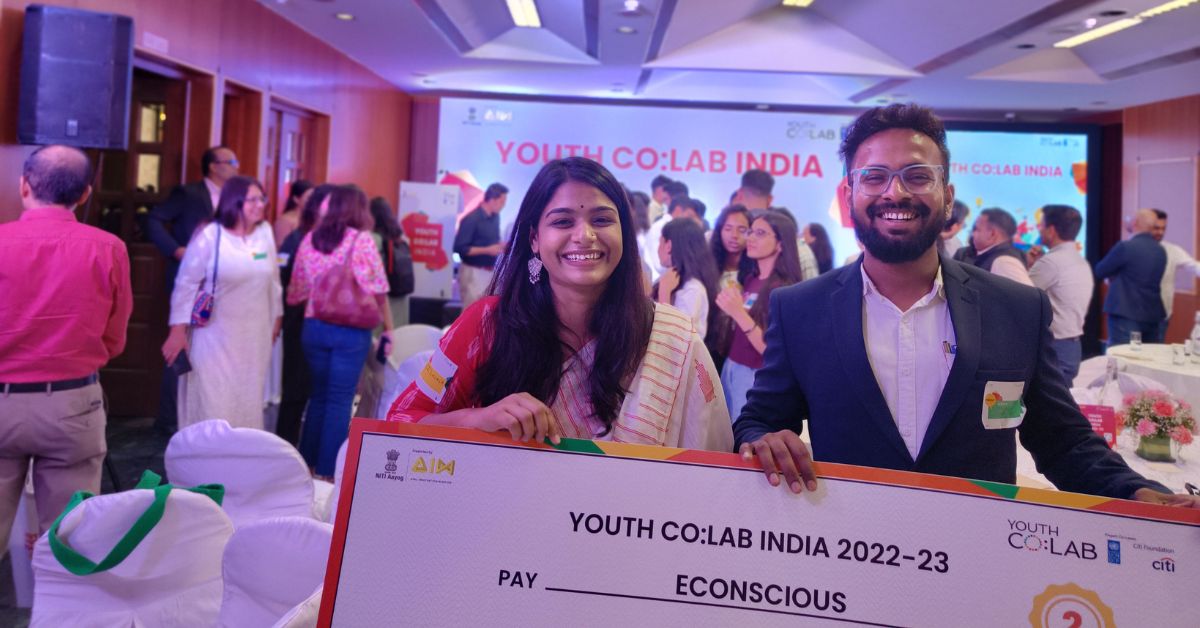
“This stark reminder of environmental challenges inspired me to pursue a master’s degree in environmental engineering after completing my bachelors in civil engineering. But seeing the beautiful mountains spoiled by plastic waste was a real wake-up call for me,” he recalls.
Fast forward to September 2020, Sonal and Vaibhav decided to get into business and started their venture ‘econscious’ just months after graduating from NIT.
In the last four years, this Delhi-based startup claims to have recycled approximately 3,50,000 kg of plastic waste to produce a range of functional recycled plastic products, such as park benches, dustbins, planters, and other eco-friendly gift items. Employing a “value-based recycling technology” to manufacture them, econscious has sought to walk the talk on creating a circular economy around plastic waste and driving greater awareness for sustainability.
Building a business during COVID-19
“The early months of econscious were both challenging and exciting. With the COVID-19 pandemic still affecting daily life, we had to navigate restrictions while developing our initial products. We spent a lot of time researching and prototyping, trying to find the best ways to recycle plastic waste into useful products,” says Sonal.
“Our first project involved creating an eco-board out of plastic waste. This board was a prototype and could be used for multiple applications. This project was significant as it allowed us to demonstrate the practical application of our recycling process,” she adds.
They also worked on creating eco-friendly gifting items, such as planters and coasters, which helped them reach a wider audience and spread awareness about the importance of recycling.
“But after much experimentation, we found that products that can be used in public spaces like benches and dustbins are suitable applications as they create awareness in the public domain about addressing plastic waste while also requiring vast amounts of recycled plastic. To make a bench, for example, we require approximately 50 kg of plastic waste. This way we could create a larger impact and soon we started developing such products,” she says.
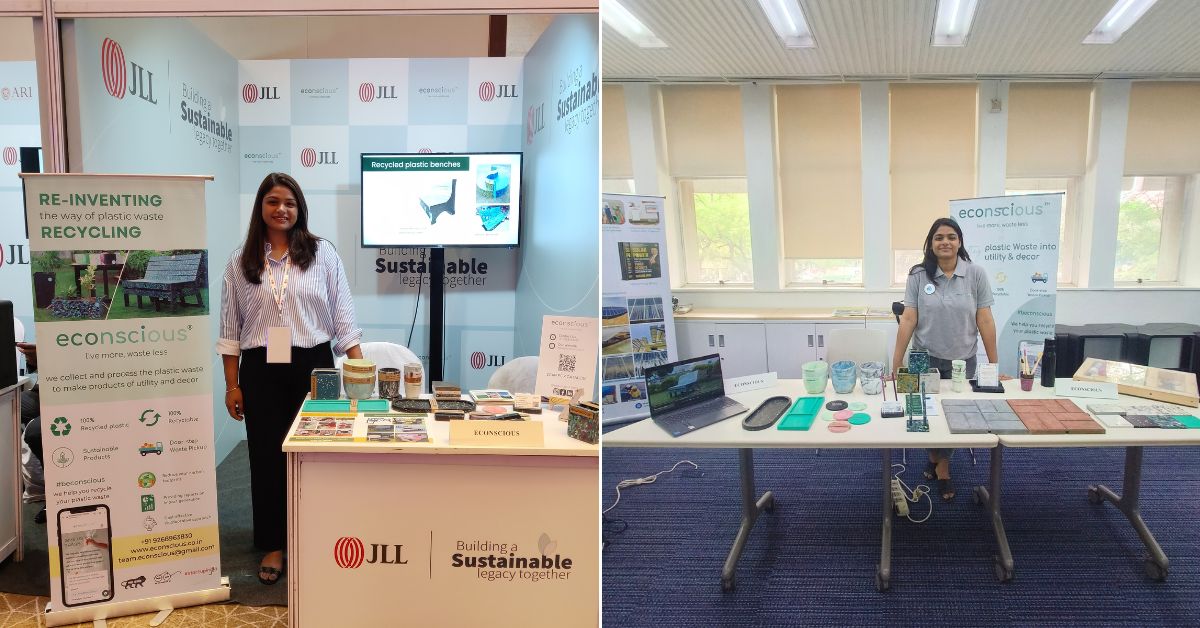
Suffice to say, there were some real challenges they encountered.
“Since we started amid the COVID-19 pandemic, it was a challenge to source material, develop prototypes and obtain customer feedback. But we were able to connect with NGOs, corporate foundations, and local government authorities who shared our vision and supported our projects. Our partnerships have been instrumental in expanding our reach and impact,” she says.
“Innovation has also played a significant role in our journey. For example, our project to create park benches from recycled plastic required us to develop new methods and designs for processing and moulding the plastic waste. It showed us that being open to new ideas and continuously improving our processes can lead to successful outcomes,” she adds.
Understanding the process
For the Delhi-based startup, the process begins with gathering plastic waste from various sources, including informal waste workers who collect materials from different locations. They also collaborate with NGOs, housing societies, and colleges to run awareness campaigns and collect plastic through source segregation.
“After collecting the plastic waste, we sort and clean it thoroughly. After the plastic waste is collected, it is meticulously sorted to separate different types of plastic. This sorting process is crucial because different plastics have different properties and melting points, which affect the quality of the final product as well as the recyclability of the recycled products. Hence we do not mix different plastic types ensuring it is again recyclable,” explains Sonal.
But it’s their ‘value-based recycling technology’ that makes econscious unique and impactful, argues Sonal. Unlike traditional recycling methods, which often produce low-quality items, she claims their approach ensures that the recycled plastic products they create are high-quality and practical.
“Traditional recycling often involves turning plastic into small pellets, which consumes a lot of energy. Instead, we skip the pellet-making process and use plastic flakes. This choice not only saves energy but also reduces our environmental impact,” explains Sonal.
“We then turn these plastic flakes into eco-boards. This is where our value-based recycling plays a key role. The eco-boards are durable and versatile, serving as raw materials for various high-quality products and applications. This process is energy-efficient and helps maintain the quality of the plastic, allowing us to create long-lasting and valuable items,” she adds.
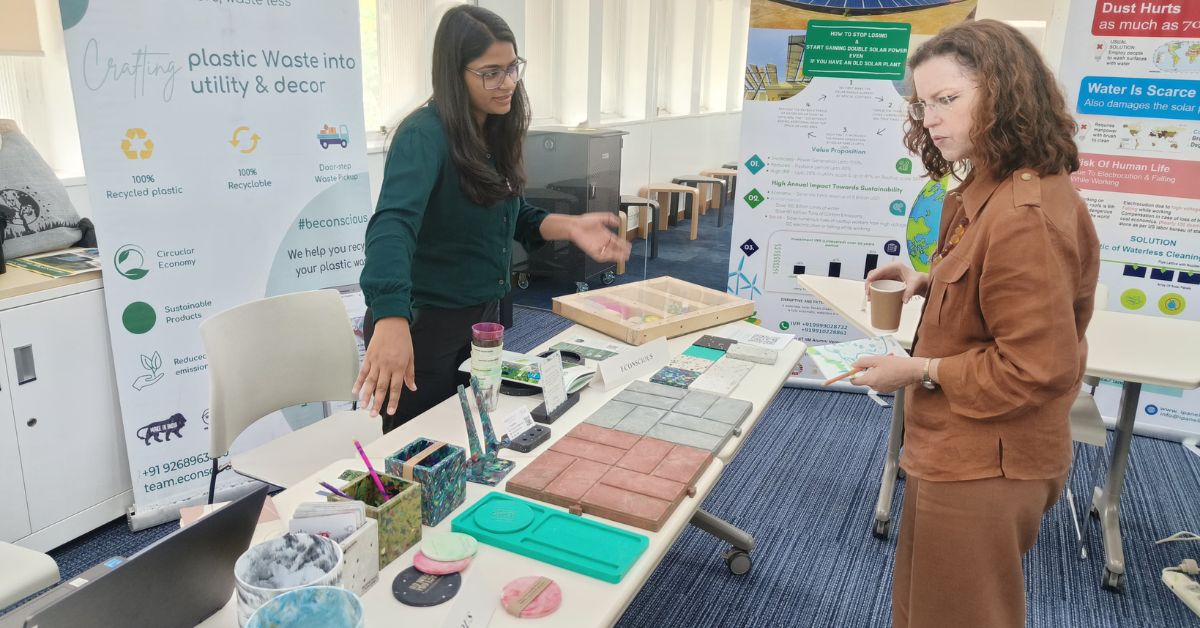
But what are these eco-boards more specifically? Eco-boards are produced using compression moulding technology, where small flakes of specific types of plastic waste are compressed to make boards of various thicknesses ranging from 8 mm up to 18 mm.
“This process is not only environmentally friendly but also allows us to control the visual appearance of the final product. By mixing different coloured flakes in precise ratios, we can create specific patterns on the surface of the eco-boards, giving them a unique and customisable aesthetic. The resulting boards closely resemble traditional plywood in both look and application,” explains Sonal.
“These eco-boards can be used in various ways, from crafting furniture to making custom-designed items. They can be easily fabricated using regular cutting and woodworking methods, and for more intricate designs, CNC (computer numerical control) cutting can be applied, allowing for a high degree of precision,” explains Sonal.
According to her, this ability to customise the pattern and design, combined with the board’s durability, makes eco-boards a versatile material. “They are suitable for a wide range of applications, whether it’s creating aesthetically pleasing products or functional items with a longer lifespan. The process up-cycles plastic waste and also adds value by transforming it into high-quality, visually appealing, and sustainable products,” she adds.
These eco-boards are then used to make a range of products, including park benches, dustbins, planters, and other eco-friendly gift items.
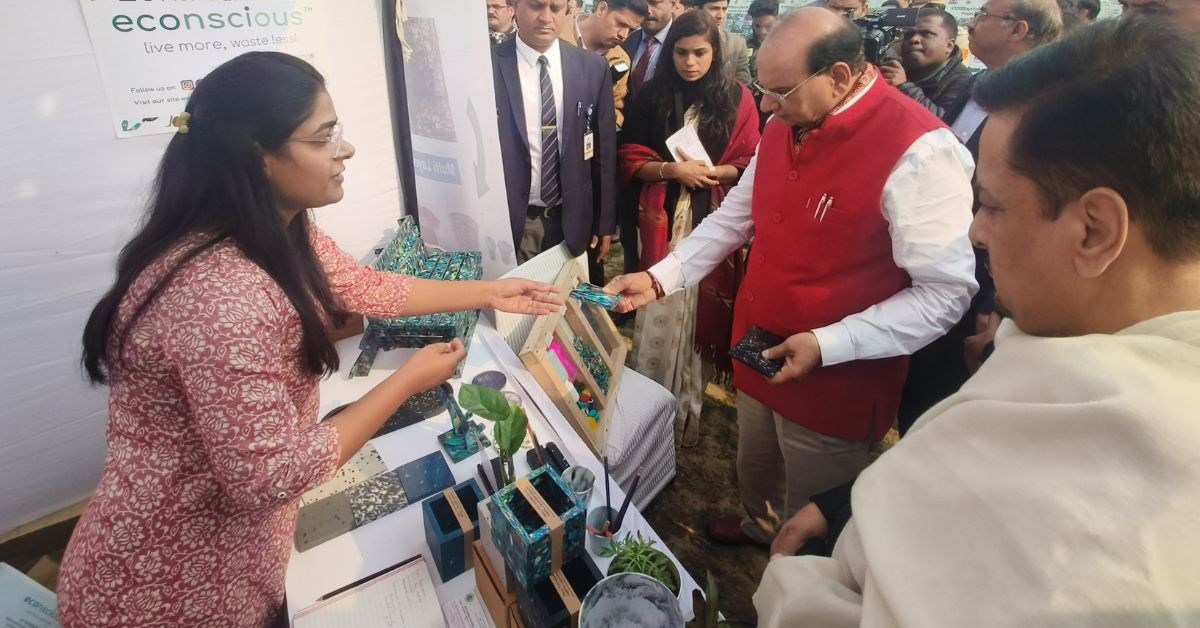
“Our manufacturing process is designed to maximise the utility and lifespan of these products. By focusing on upcycling, we give plastic waste a new life as useful and aesthetically pleasing products. Our products are crafted to last, offering lasting value to our clients. With high-quality materials and innovative production techniques, we ensure that our products are durable and significantly reduce plastic waste,” she claims.
Going further, Vaibhav argues, “Beyond the products listed in our catalogue, we welcome new ideas and customisation requests from our clients.”
While their primary focus is on using plastic flakes, they also explore other methods to enhance the strength and appearance of the products.
“We can also use the granules to make the board and to get any desired colour if required. The detailed steps in our process are fine-tuned for efficiency, but the core principles of sorting, cleaning, and compressing remain the backbone of our operations. While some aspects of our technology are proprietary, our overarching goal is always to reduce waste, save energy, and create sustainable products,” claims Sonal.
Navigating India’s waste management rules & other challenges
Navigating the waste management sector in India comes with its own set of challenges. One major hurdle for econscious has been dealing with compliance and regulations. “These are often designed with large industries in mind. There are no specific guidelines tailored for startups like ours which employ around 15 to 20 people at any given time. This can make it difficult to understand and meet the requirements effectively,” she says.
“Another significant challenge we face is accessing funds from investors. Many investors prioritise financial returns, whereas our focus is on creating social and environmental impact. While we have been fortunate to receive a few grants from private organisations, which have been instrumental for us, we still need more funds to scale our operations effectively,” she says.
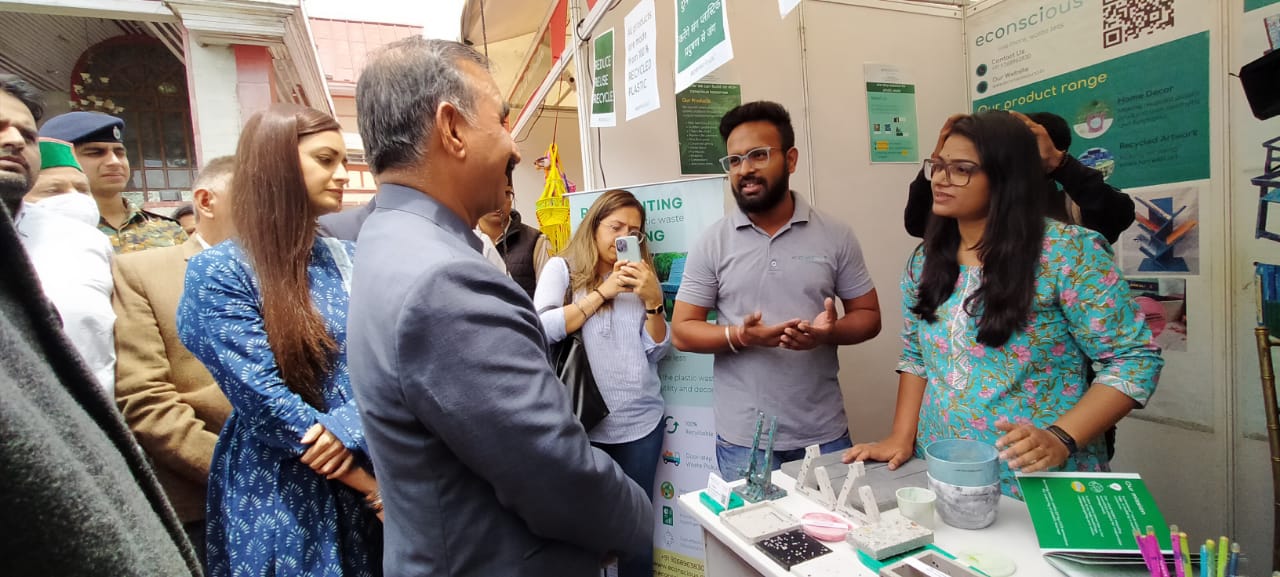
“Additionally, securing a consistent supply of plastic waste has been challenging. Although we have established partnerships with some organisations, scaling our operations requires a more reliable and continuous supply. This involves overcoming logistical issues and obtaining the necessary approvals from local authorities to make things more efficient,” she adds.
Business model
The business model at econscious is built around recycling plastic waste into “high-quality and eco-friendly products”. They focus on transforming collected plastic waste into durable items such as park benches, dustbins, planters, and other sustainable products.
“Revenue is generated through the sale of these recycled products. We cater to various clients, including, corporate foundations, government authorities, and NGOs who value our commitment to sustainability and quality. Our model is supported by the growing market demand for sustainable products. Since the inception of this business, we have generated over Rs 1 crore in revenue, reflecting the effectiveness and impact of our approach,” claims Sonal.
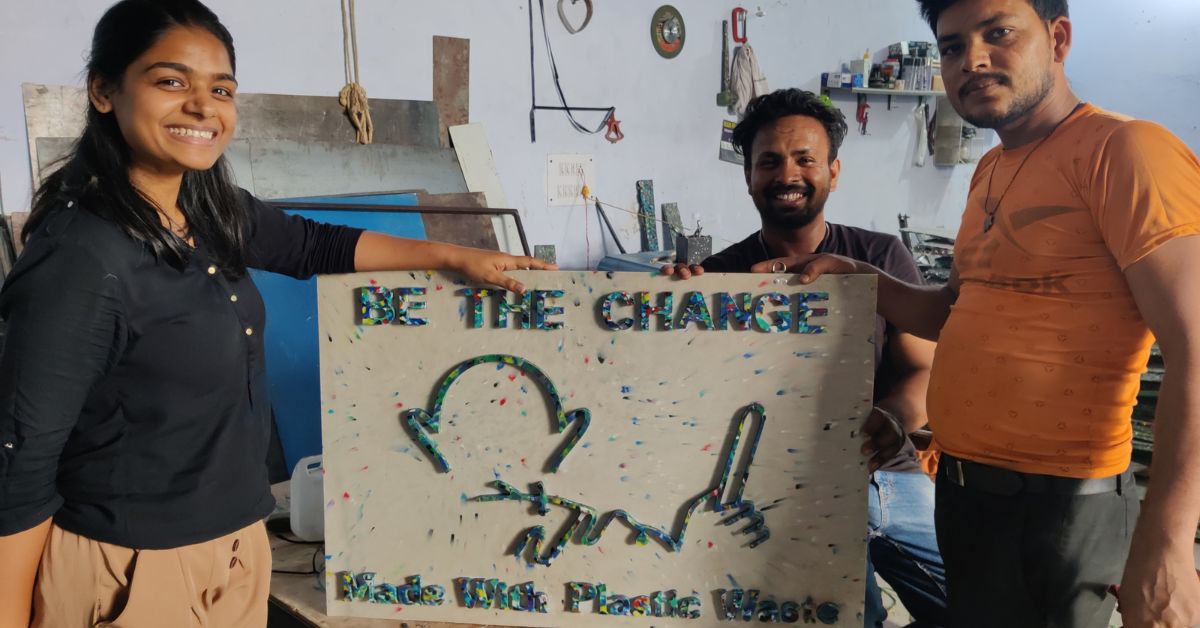
Dr Ruby Makhija, the founder of Why Waste Wednesdays Foundation, a Delhi-based non-profit, claims, “econscious has exceeded our expectations with their products and designs. The quality of the recycled plastic benches, mementos, pots, tables, and collection boxes we purchased from them is good. What stands out about their products is the attention to detail.”
Working with brands
Since its inception, the Delhi-based startup has partnered with companies like Bisleri, Nestlé, HCL Foundation, P&G, Green Dream Foundation, The American Centre, and other such clients.
“These collaborations have been instrumental in validating our business model and scaling our operations. These partnerships work by aligning our expertise in recycling with the specific needs and goals of each brand. For instance, with Bisleri, we supported their ‘Bottle for Change’ initiative by providing eco-friendly products made from their plastic waste, which helped them enhance their sustainability efforts. Similarly, with Nestlé, we developed customised solutions that aligned with their environmental commitments,” says Sonal.
“We have also created bespoke products for these clients, including branded park benches, planters, and dustbins that incorporate their logos and colour schemes. We continuously seek ways to expand our market reach, enhance our product offerings, and leverage new technologies to make a greater impact in the future,” she adds.
Looking ahead
“Our primary goal is to scale our operations to handle larger volumes of plastic waste and expand our presence to multiple geographical locations. By investing in advanced recycling technology and infrastructure, we plan to increase our processing capacity and enhance our ability to produce a diverse range of high-quality products,” notes Sonal.
“We also intend to develop products with longer life cycles, aiming to reduce the likelihood of even recycled plastic items ending up in landfills. This involves creating durable and versatile products that provide lasting value. Additionally, we will work on expanding our market reach, both within India and internationally, to grow our presence and impact globally,” she adds.
(Edited by Padmashree Pande; Images courtesy econscious®)
No comments:
Post a Comment